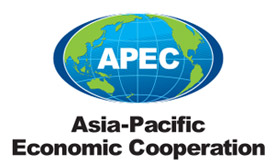
Introduction
The Asia Pacific Economic Cooperation (APEC) was established in 1989 in response to the growing interdependence among Asia-Pacific economies and the need to advance Asia-Pacific economic dynamism and sense of community.
APEC operates on the basis of open dialogue and equal respect for the views of all participants. There are no binding commitments; compliance is promoted through peer pressure and where appropriate supported by economic and technical cooperation.
APEC's Scope of Work
APEC works in three broad areas to meet its goals of free and open trade and investment in the Asia Pacific by 2010 for developed Economies and 2020 for developing Economies – "the Bogor Goals".
APEC developed its three pillars to achieve these goals:
| |
- trade and investment liberalization
- business facilitation
- economic and technical cooperation (ECOTECH)
|
Bogor Declaration
Since it inception, APEC region has grown consistently and generated almost 70 percent of global economic growth in its first decade and continues to grow through sustained commitment. As a result, APEC region economic growth persists and outperformed the rest of the world.
Over the last few years, APEC works has widened to include other areas such as climate change, food security as well as anti-terrorism. The commercial impact of terrorist attacks, regional epidemics and natural disasters reinforces the link between trade and human security. APEC is meeting these new challenges through cooperative activities aimed at ensuring trade and economic development continues while safeguarding the people and economies of the region.
APEC Member Economies
APEC's 21 member economies are Australia; Brunei Darussalam; Canada; Chile; People's Republic of China; Hong Kong, China; Indonesia; Japan; Republic of Korea; Malaysia; Mexico; New Zealand; Papua New Guinea; Peru; The Republic of the Philippines; The Russian Federation; Singapore; Chinese Taipei; Thailand; United States of America and Viet Nam.
These account for approximately 40.5%1 of the world's population, approximately 54.2%1 of world GDP and about 43.7%2 of world trade.
Brunei Darussalam chaired the APEC meeting in the year 2000 with its theme 'Delivering to the Community'. At this APEC meeting, leaders agreed to adopt the Brunei Goals to triple the internet access by 2005 and to ensure all groups
within an economy to have access to the internet by 2010.
APEC 2000 Brunei Darussalam
Recent Highlights
